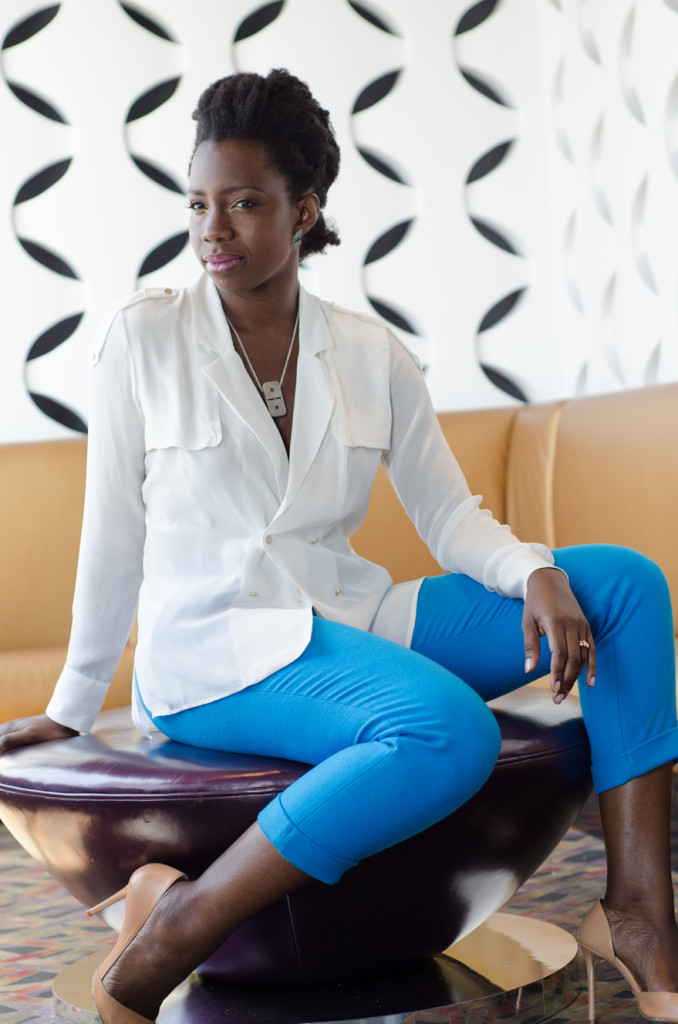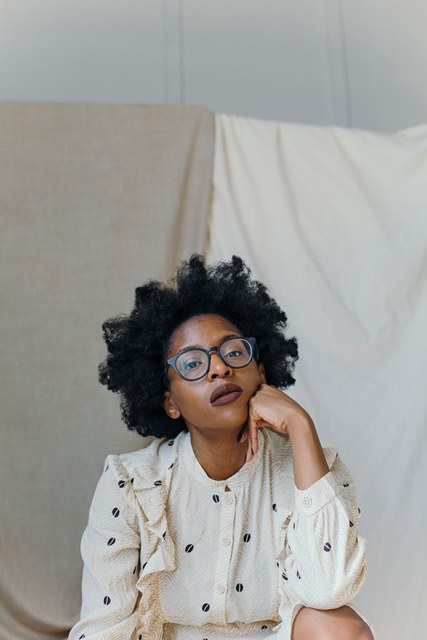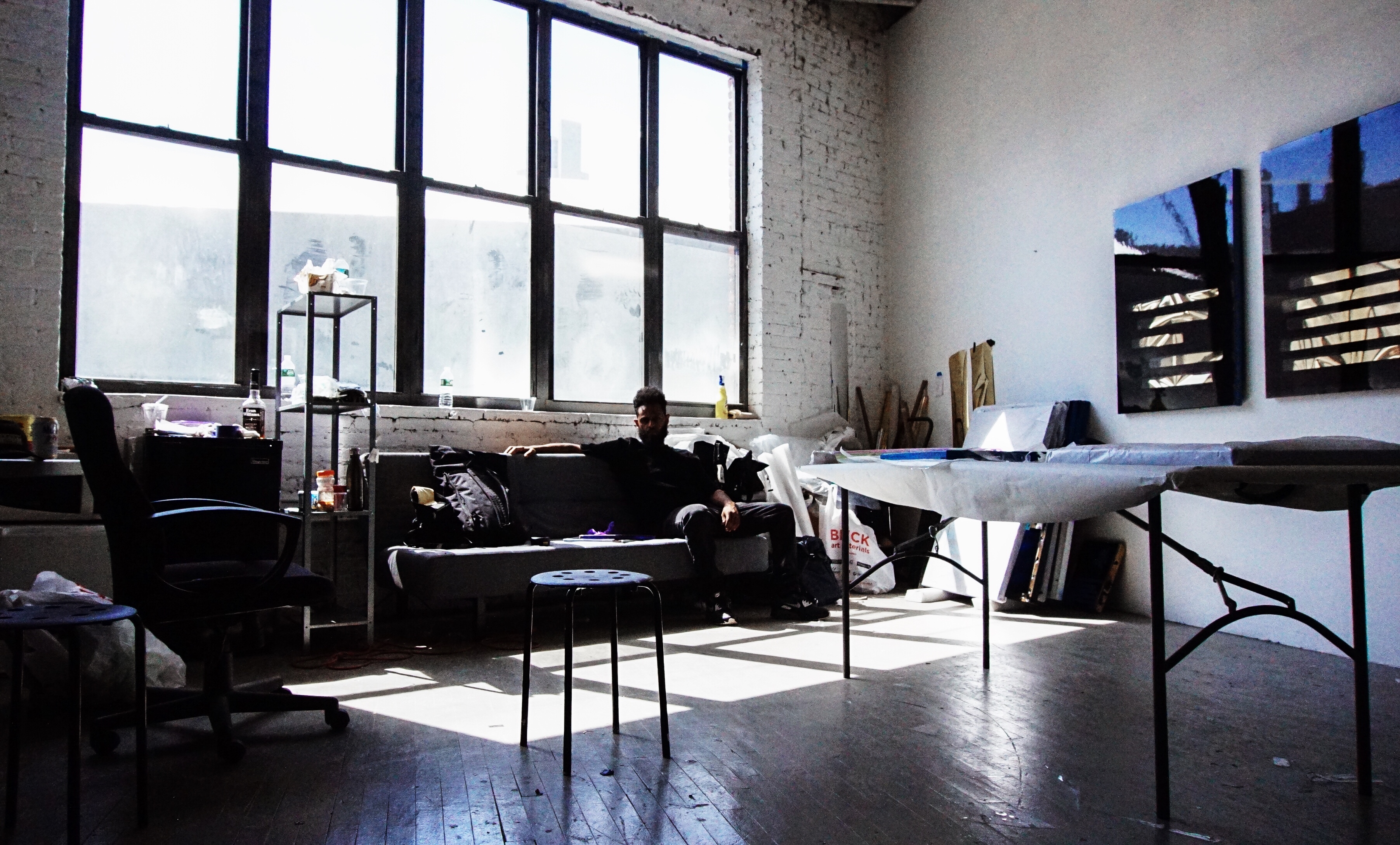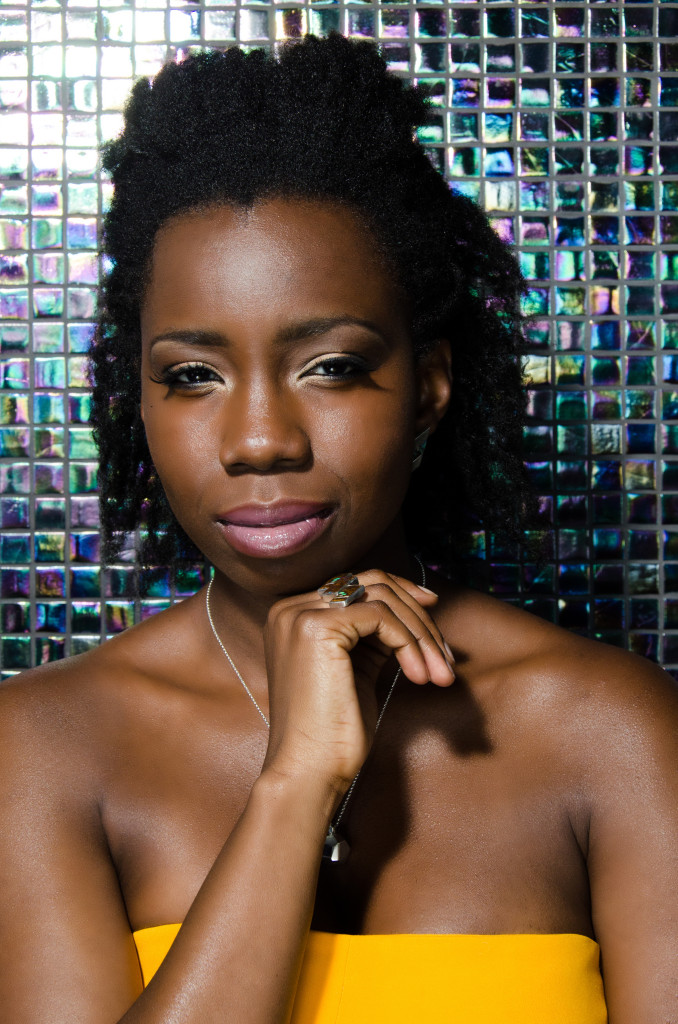
Dress, Reed Krakoff; 2 small rings, Dee and Ricky for Urban Boulder; Necklace, Earrings, and Brick Ring, Urban Boulder
Photography by JD Barnes
Shot at Brooklyn Terrace atop of the aLoft Hotel.
By Ashley P. Williams
As Told to Kristina Pejovski
What’s your AMMO?
Sorry, I’m getting emotional. My Ammo is my family, my mom, my friends that supports me, love, and creating. Yeah I’ve been really, really blessed because it hasn’t been an easy journey. People who support me and believe me when didn’t believe in myself.
So did you always know you wanted to be an actress?
No, definitely not. I wanted to be a doctor for the longest time and then I got to college and in the beginning I had inklings I didn’t want to do medicine and then my father passed away suddenly. That was the moment I knew I couldn’t go to Med. school. Life was too short to do something you don’t want to do. Yeah and I took an acting class my senior year and I loved it! But I’ve always done the arts so at the time, it felt random. But in hindsight, it was not random at all.
How was playing Alike in the film Pariah shaped you as an actress?
Oh man, playing Alike in Pariah was a life changing experience just because working on Pariah was the first time I had an opportunity to be a lead in a film, like a character from beginning to end with an arch. So it felt like for me it was my first opportunity to do what I do as an actor and discover a lot of things about myself as an actor and also discover the feeling that this is what I was put on this earth to do. And then to be a part of a project where I meet people all the time and they tell me how much they like the film and share their stories of their youth; whether they are gay not, so many people related to this film. And this is why I became an actor.
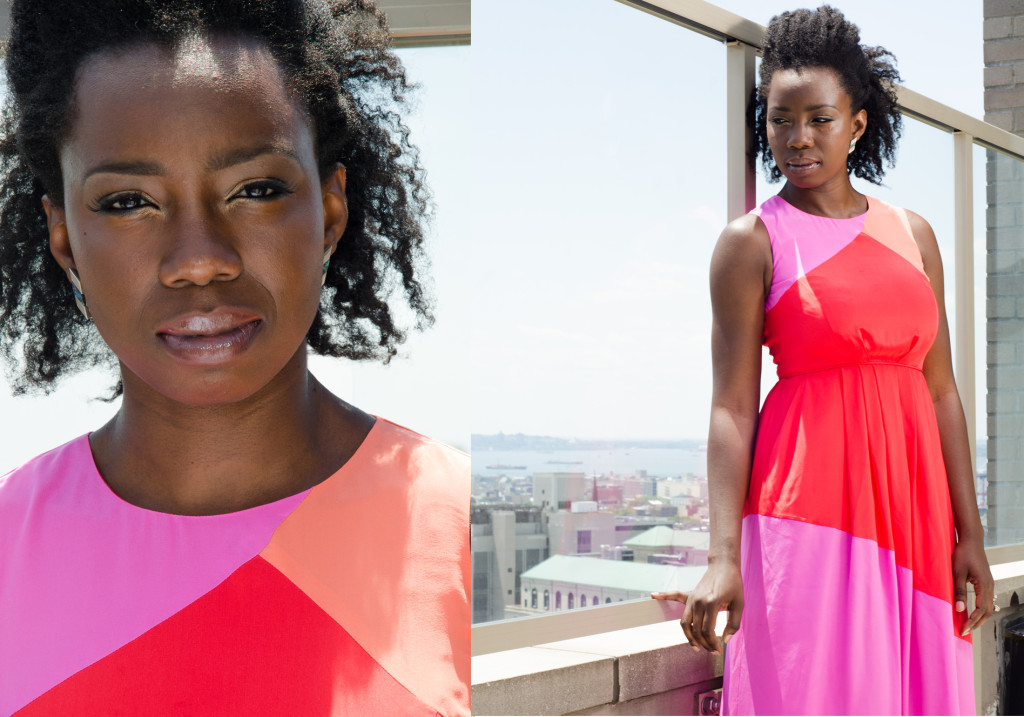
Dress, Shoshanna; Earrings, Urban Boulder; Rings, Dee and Ricky for Urban Boulde; Shoes, Pour la Victoire.
Pariah was a complex and sober film that explored the nuances and challenges of coming of age as an African American lesbian teen in one of the most diverse and liberal cities in the country. Do you ever wish black cinema would address these topics more often?
I feel like there are people in black cinema that are doing nuance complex stories because as we all know black people were not a monolith, whether I’m Nigerian, grew up in Brooklyn or friends I have; it’s diverse. I feel like the conversation is around the lack of those stories, but I’m surrounded by people personally in NY, who ARE telling those stories, so for me I am optimistic and it’s just a matter of time before these filmmakers are able to put these films out. It’s happening, it’s here.
I’m a first generation child in the states, and I’ve always felt like it was a bit of a struggle learning to acclimate my family to American culture. As a coming of age story for your character, have you experienced your own coming of age as the daughter of two Nigerian parents?
Yeah, I think for me; how I relate it to Alike and the whole; is that I know what it feels like to be an outsider, so because my family are immigrants, that was the first thing I related to. When I read the script, I knew immediately what it felt like to not feel comfortable in your own skin or not feel comfortable in your own environment. Or feel like people are trying to label you or tell you should be or act this way. Yeah, it’s just an outsider thing I understand really well.
So you’re Nigerian, and your family is a crucial component in your life. What reactions have you received not only from your family and friends, but also from society regarding your role in the film?
Yeah I think my family and friends and people in general in terms of Pariah , I think people assume there has been a negative backlash with my participation in the film but I haven’t seen any of that or felt it. I have actually had people say “I don’t like movies with gay people, but I like this film” and I think, the fact that someone can even say that, that shows the power of film. Even my mom, who lives in Nigeria, just because of me being in this film, she looks at issues around LGBT with more awareness. She called me one time from Nigerian, around the time they were killing people in Uganda because they were literally seeking out gay people and killing them; and she called me and said “Pariah needs to come to Uganda because they are killing people and I don’t understand why.” She was pretty cool but for her to vocalize it that way, I thought ‘Wow’, because of [my] involvement in the film, she is looking at it in a deeper way. A lot of people asked me if I worried about being typecast, and that thought never crossed my mind. I just saw a story and a character and nuance and complexity, and amazing writing. And that’s what life is about so it didn’t matter to me about the sexuality. I never worried about what people thought, I have gotten a lot of positive feedback.
What can you tell us about Twelve Years a Slave?
The next film I’m in is called Twelve Years Of a Slave and I play a woman named Eliza. I got to work with the amazing Steve McQueen, and it was more than a dream come true and it’s based on a narrative about a free man from NY who was kidnapped and sold in slavery in Louisiana, and I play this woman Eliza who is kind of like a free character, she been living like a free women. Her master’s concubine has a child with him and his family kidnapped her and secretly sold her. I meet the main character as we are traveling to Louisiana to be sold as slaves. It was very intense role but amazing in so many ways.
Outside of film, you have also done some notable stage work. Do you feel most at home in front of a camera or in front of an audience?
I love them both for many different reasons. I think honestly, the reason I became an actor is because of film. I saw The Apostle and I knew that’s what I want to do as an actor, so film is a wide reaching medium, they can take a DVD years later. People can still watch a film and be affected by it, so I love film for that. But what I love about the stage is that you rehearse for four weeks and you perform a show and even though you perform many, many times, you can still discover and gain something new, like on the 25th performance. I think the opportunity to start fresh every day is amazing, because you can always try different things and discover new things, so I love theatre for that because that’s what hard about film. You know, you don’t get much rehearsal and the pressure to get it right in the moment.
Can you take us through a typical day for you? Where do you like to dine, relax?
Oh man, I love to eat!! And I love eating with my friends. I love Senegalese food; I get Senegalese food in Harlem all the time. I love donuts; it’s really bad! I love to eat, and I really love NYC. I’ve been fortunate to travel to a lot of different places in America this past year, but there’s just something about NY. What I love about NY is that I can discover new things and new places to eat all the time; and I also love to dance, so anytime there is an opportunity to dance, to really get down with sneakers on, that is, yeah, a welcome, welcome opportunity.
Which career moment has been most special to you thus far?
The thing about standing on stage opening night, at that moment it hit me, that anything is possible, because I started acting, I really struggled with the question, ‘Am I trying to do something that impossible?’ I wasn’t sure if someone like me can do the kind of work I want to do, so to stand up on stage at Sundance, it was pretty mind blowing, and I knew that anything is possible because of my journey and I have to say, Meryl Streep shouting me out at the Golden Globes was pretty shocking. I love her, so the fact she saw Pariah and said it in public and said my name in public was insane. Those are two moments that are great.
Tell us about Ava DuVernay’s The Door
I think the Miu Miu short, The Door, embodies friendships among women. I feel like what’s happening right now is a lot of media you see women who are very catty and at each other’s throats but the relationships I have with women in my life are the most fulfilling blessing relationships I have in my life. The fact I have friends I can call to when I’m really feeling down, people who aren’t going to judge you. I feel like that’s what the short embodies; women coming together and being there for one another. Because it does happen.
What’s next for Adepero?
I’m in a space right now where I am exploring and creating outside of acting. So writing, directing.. I wrote a short that I’m going to direct this summer. At this point in my life, I feel like I am ready to mess up, fall flat on my face, I’m not letting fear hold me back. But the only way to get better Is to do it. I want to continue to collaborate with people on art, just explore and expand and do more work in the vein of Pariah and Twelve Years a Slave, and travel to.
Credits:
Photography; JD Barnes
Wardrobe; Tatum Pia
Hair; Daneza Martinez
Makeup; Rodney Jon
Production Coordinator; Starr Stokes
Shot at Brooklyn Terrace atop of the aLoft Hotel.




